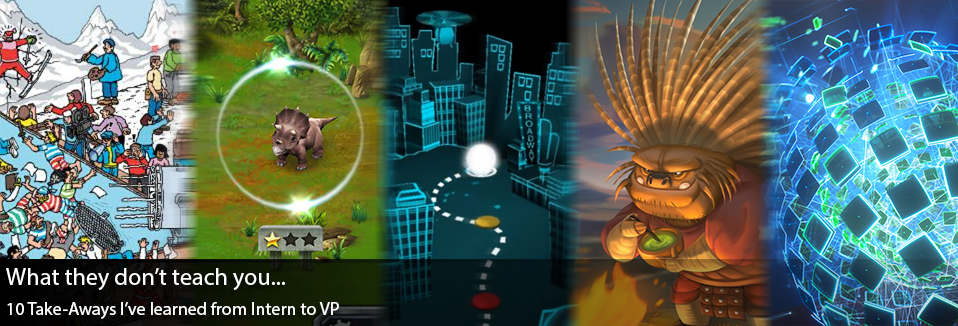|
|
Personal Projects
|
|
|
***this was also published on boss magazine here*** When I finished College, I really thought I had it all figured out. Having taken copious leadership courses outside of my normal degree workload, I was certain that I was well equipped to enter the job market and seek out a leadership position. Having now gone from intern to VP, I realize there was much I didn’t know and continue to learn each day. While College had established truly valuable fundamentals, there was still so much I wasn’t really prepared for. Today’s post is going to be a bit different, as I’d like to talk a little bit about my takeaways from being a leader at two vastly different companies thus far… and what I wish I had known earlier on. 1. Being a “Jack of all trades” doesn’t make you a good leader.This was probably one of my earliest lessons I learned when I became Lead Artist. Early in my career I prided myself in taking on new challenges, new forms of art, and being able to be agile with my workload. That said, it’s a challenge to transition from that mindset in a healthy way once you’re a leader. Once I had my own team, I was often quick to still take on a lot of the artistic responsibilities on projects. I would see my artist being slower than me on a task, and it was hard to not take it away and fix it quickly myself. While in some instances this works, in the long run you’re really not guiding or developing your team. Without given opportunities to try, you effectively start to stagnate your employees and it shows a lack of trust. Effectively one of the hardest things to do, is to learn how to let go once you’re a leader. You have to realize that you were given opportunities to succeed or fail, and you need to provide the same opportunities to your employees. Finding areas of safe failure, is both a challenge and a responsibility as a leader. By safe failure I mean you need to provide opportunities where if someone fails it doesn’t implode the project you're working on and you can help build new skills in a safe environment. That said, this doesn’t imply that you shouldn't be in the trenches with your people… in fact I find it to be incredibly valuable for you and them if you are. 2. Everyone communicates and learns differently.We all learn about personality types and Myers Briggs in school, but until you’re truly put in a position where you have to educate and communicate with vastly different personalities… this is where it becomes painfully obvious that you have to shift tactics depending on the individual. To that end, setting up personal time to get to know each and everyone on your team is incredibly important. At times this can be easy in an office environment, you invite a coworker to coffee and you can chat about work or life. Yet if you switch to remote work, it’s much more difficult to simulate those casual water cooler type meetups. Setting up one on one calls, and providing a space that isn’t intimidating and centered around the employee is crucial. For some, it can be intimidating to “talk to the boss” yet it’s up to you to help alleviate that fear. Personally I use humor in an effort to remove tension, but leaders should lean into their strengths. In today’s world, there’s a lot that can get complicated. Mental illness, depression, and burnout are all relevant fears in today’s working environment. Getting to know your employees builds trust and helps you see problems before they start. There are also those who may leverage mental illness as a shield to protect poor work ethic… which is both extremely hard to identify and a sensitive issue. I have experienced both worlds where people are genuinely struggling, and others who have fabricated some pretty tall tales to avoid work. This is why it’s so important to understand those who work for you, not only to help grow and evolve their careers, but also to spot issues before they start. 3. Sometimes the hardest thing to do, is to recognize that there are no villains.Objectively while working, it’s highly likely you’ll run across a co-worker that may seem villainous. They could be aggressive and hostile, passive aggressive, condescending in emails, or just plain disrespectful. It may seem like they are out to get you, yet I’ve found that’s rarely the case. What is highly likely, is that they are under pressures unknown to you and are managing it poorly. As much as we don't like to admit, we’re creatures of emotion and many struggle to manage their emotions in productive ways. It’s equally difficult when presented with unprofessional behavior, to not respond in kind or to recognize that it could be coming from external pressures the other person is experiencing… and they aren’t just “evil.” Although there are a couple caveats to this discussion… Toxic people do exist We often throw around the term “toxic” in today’s media, yet “toxic” is extremely hard to define in my opinion. Although I found this article on “The Greatist” that best aligns to my experiences with toxic personalities: “One way to tell you have a toxic person in your life: Every time you encounter or hang out with them, you feel exhausted, emotionally drained, and negative. There’s always something with this person.” I find the toxic people in my life are often dealing with their own forms of depression or mental illness and have a hard time with their own sense of self… and often manipulate others to help fill the void in their own self esteem. In this Greatist Article, Irwin goes on to say : “You know you are being manipulated when you begin doing, saying, or believing things that are serving them, as opposed to you. Healthy people encourage and empower you to be your best. Manipulators tell people that they know what’s best for you.” I would highly encourage that you check out this article to learn more on toxicity, it’s rare but does exist and can easily ensnare you if you’re not careful. With egos, sometimes there’s no “winning” Some people are purely ego driven and are blinded by it. In these instances, I find it’s hard to get to a logical point in the discussion and it often feels like an argument for argument’s sake. For these types of personalities, you really have to know what hill to die on and understand that you’re going to have to make a concession somewhere in order to further the dialogue. Not that you need to actively stroke the other person’s ego, but letting them feel as though they have a win in the discussion (as painful as that can be) is typically the easiest path to a resolution. It’s not fun, but it becomes a form of negotiation where hopefully the conversation will land in a place that’s fruitful. Caveats aside, the sooner you recognize the other person as a person (flawed or not) instead of a villain… hopefully the conversations will become easier to manage and understand. 4. Taking the highroad is not fun and never fair.When conflicts arise at work, it’s hard to not want to be petty. We all know we want to take the high road… yet it’s a quiet one. You’re not making as much noise as someone else, you’re often taking low blows and not retaliating, and it’s rare that you’d receive any recognition because of it. That’s not to say you shouldn’t be taking the high road in disagreements, but it’s just a thankless job. The difficulty here is that the highroad could be misinterpreted to be the submissive road, and it’s equally difficult to hold your ground in a way that isn’t combative, yet isn’t giving in. The best ways of doing this, is trying to remove as much emotion as possible from replies where the other person is being particularly combative. The best advice I could give, is to never respond immediately… write multiple drafts of a response, try to filter out any sort of tone, and be as forthcoming as possible. This is extremely sensitive and difficult to do, yet if you don’t the highroad just becomes a freeway to drive over you. I wish I had some sort of silver lining to throw in here, but really when it comes down to it… you take the high road for own sense of self worth. It’s the age old argument that you shouldn’t stoop to another person’s level in a disagreement, and you can only hope that it gets recognized. 5. Don’t become a work Martyr!Okay I’m definitely stealing this one from an article “5 Signs that you’re a work Martyr,” and it just resonated with me. If you’re anything like me, it’s easy to let work consume your life and even your identity. Working from home, and having remote workers in vastly different time zones, I often feel the pressure to always be available on my phone. I often receive late night or weekend work related calls, and it’s hard to not feel neglectful if you’re not available… yet you have to take a step back and mentally give yourself working and non-working hours. I understand there are certain calls you should try to never miss, but you also need to get more comfortable in knowing that the world will still turn and work will still get done…I don’t want to just be responding to the points in the article here, but I did want to plug it as I think it’s been extremely insightful. Check it out! 6. Letting people go sucks! Unless you’re heartless…One area that’s not often discussed is how difficult it is to let people go. There’s a lot of preconceived notions surrounding being a manager and having the ability to “fire people,” and let me just say… unless you have some sort of major dislike for the other person, it’s incredibly stressful to do. You’re affecting someone else’s livelihood, and even if you might have had disagreements with that person, as I said above, no one is a villain and it’s a hard decision to make. It’s a delicate situation that you have to make sure you’re confident in, and that you’ve done your due diligence to ensure you’re making the right call. On this point, I’ll also bring up how equally important HR documentation is. HR matters and they have your back in these scenarios. It’s always good practice to send our email summaries of verbal meetings, to make sure there’s always a record. If you’re having a disciplinary meeting it’s equally important to not only send a recap, but also invite the other person to weigh in and say if they find it to be either accurate or not. This way you’re keeping an accurate record, and it doesn’t have just a one sided opinion on what transpired. Letting people go is easily one of the most emotionally draining and stressful responsibilities a manager has. 7. People will start to treat you differently...Have you ever been one to try to schmooze your boss at a company party or social gathering? Let me just say, having the shoe on the other foot… it sucks yet I was totally guilty of it early in my career. A few drinks happen and suddenly it’s a really good idea to ask for a raise, but you have to realize how incredibly awkward that is for the other person. I’ve noticed as my title has changed through my career, that some people just start to treat you differently. You can start to pick up on the fake laughter of your jokes, how some people seem to prioritize sucking up to managers vs mingling with peers, and you realize that your presence at an event feels anything but casual. For employees: my advice would be to try to always keep it as normal as possible, it’s fine to talk work but try to realize too the other person is also here to let off some steam. For managers I’d say always be humble and keep it casual, if you’re approached on career advancement, raises, or just a topic you’re uncomfortable with… be clear that this isn’t the proper forum for the discussion, but if they want to have that discussion you can on the following work day. This will likely cause some awkwardness, but whose fault is that really… 8. It’s still a Boy’s Club.As uncomfortable as that statement is, I’ve found it to be pretty accurate. Honestly I haven’t been exposed to some of the more stereotypical “bro” environments like joining a fraternity or being part of a larger sports team, and yet this is the best way I could describe the atmosphere at some of these leadership outings. Even with everything in the news, I still didn’t think that I would experience it in my job… Yet when you do, it’s a troubling moment and something that I’ve been conflicted about. It’s hard to not feel like you’re part of the problem when you’re a privileged white male, sitting at a dinner with other white males who are making potentially inappropriate comments. I didn’t really put two and two together, until I really started to think about who got invited to some of these dinners and often it wasn’t my female co-workers. How do you tow the line of being an ally, and not jeopardizing your standing at work? For me, I choose what hills to die on… In scenarios where the attractiveness of a coworker is being discussed, I like to interject how good they are at their job… This can always bring up a bit of awkwardness, but shines light into the inappropriate nature of the discussion and I find shuts it down pretty quick. You should also take what opportunities you can to advocate for strong female co-workers in these settings, and encourage their involvement in meetings and events in the future. There’s a fine line between just looking like a social advocate, and being complicit in this issue. Yet if you’re surrounded by potentially toxic behavior, that’s something you likely won’t be able to change overnight, but I honestly think you can do more good from within. It may also be difficult at times to not feel reactive towards statements that are made, but keeping a cool head and being a positive voice in these settings is often the only move you really have. Beyond that, if you feel as though you’re in an unchanging and toxic situation at your job… You may have to acknowledge that your participation at that company could be perpetuating a toxic culture, and you may want to consider a shift in career. 9. It’s okay not to know, and better to know that you don’t!Through today’s educational culture, there’s a lot of fear of seeming like you’re not an expert on everything. As I grew in my career, I started to manage not only very different personalities but also vastly different skills… that I certainly never studied in college. There’s always the feeling that those in management, are experts in their individual fields. Yet being an expert in a particular field, doesn’t make you a good leader and I’d argue now that most leaders aren’t experts in all of the skill sets that they manage. When you’re managing a small team, it’s more likely that you’d be able to really get into the minute details on all elements of your team. Although as you start to manage more and encompass more responsibilities, you have to be more comfortable in not being a subject matter expert in every element that falls under your department. I’ve felt a considerable amount of stress surrounding this topic, and not feeling as though I could as easily get into the trenches of every project that I lead. That said, some advice that helped me wrap my brain around this ways someone finallying telling me that “It’s fine if you’re not an expert. You hire and support experts on your team. Do you think that everyone at the C-suite level are experts of everything that’s underneath them?” This really helped open my eyes and feel more grounded in what it means to be an executive… which I only realized later is very different than just being a “lead.” I’ve always championed for servant leadership, but I find it gets exponentially important to lead in this manner as you work your way up the chain. You should hire the experts, get to know them, and support them as best you can to keep your teams effective. While it’s okay to not be an expert, learn what you can about all elements that are being worked on, but also trust and don’t micromanage your team. By not being an expert yet an executive leader can easily lead to Imposter Syndrome. It’s hard to not feel as though you don’t deserve to be in the position you’re in, worried that you’ve somehow stumbled upward and everyone will find out that you don’t belong. Especially if you compare yourself to the experts you hire. Frankly, I’m not sure if this sense of unease will ever go away… Yet you can only do what you can, attempt to make working life easier for your people, and support them in their accomplishments. Now that I think about it, imposter syndrome will likely keep you humble… and that may not be a bad thing. 10. Sometimes you should jump.We all get comfortable. Sometimes we can find ourselves getting into a comfortable rhythm at work, being an expert at all the processes, your brain can go on autopilot to get the job done. Sometimes we don’t realize that we’ve stopped being challenged… and it feels good. Yet, you may only discover later that you’ve been stagnating. Your skills may get rooted in archaic processes, you start to lose the drive you once had when you were younger, and the status quo becomes pretty appealing. Not to mention that change is scary, we naturally fear the unknown and yet it’s just that… unknown. We don’t know unless we try. Of course there’s always the opportunity for failure, and yet the growth that comes from failure is often the most educational. I’m not suggesting that you should always be changing careers, but I believe you should always be looking ahead and not getting stuck in the past.
Hopefully if your current position isn’t offering you opportunities to evolve, you’re still at least using that stability to evolve your personal life. Personally I’ve taken a few leaps of faith; moving to Montreal right out of college, moving back and starting a remote career in a vastly different industry, deciding to uproot and move to the opposite coast, and taking on an additional and totally new department at work… all of which has been pretty scary at times. What’s helped me through these phases of change has been to focus on the here and now, what you have immediate control over, and you can’t sweat the mountain ahead of you. Every mountain, in its entirety, seems daunting and yet each are just a collection of steps and you can control your pace. Sometimes the most difficult thing is to take the first step, but you need to remind yourself that you walk every day. I hope this has been insightful! It’s certainly been an introspective experience for me to get my thoughts down on paper, as uncomfortable as some of them might be. Thanks again for reading and I hope some of these thoughts might help you as you progress in your career!
0 Comments
|
AuthorI make games, I play games... and sometimes I have some thoughts about that. Archives
March 2024
|
Proudly powered by Weebly














 RSS Feed
RSS Feed